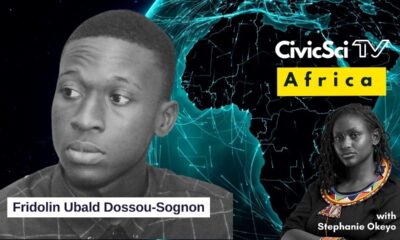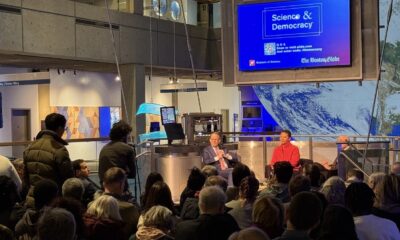Stories in Science Special Series
Paying it Forward Matters
Dr. Avital Rodal: “There are many reasons to pour your heart into helping and supporting others, including the knowledge that you are doing the right thing, and the appreciation and gratitude that it brings back to you. I discovered that paying forward the support and mentorship that helped me is a reward in itself.”

Avital Rodal
[su_boxbox title=”About”]Dr. Avital Rodal is an Associate Professor of Biology at Brandeis University. She grew up in a big family (the fourth of six children; five girls and one boy) in Ottawa, Canada. She majored in Biology and Chemical Engineering at MIT, and did her PhD with David Drubin at the University of California, Berkeley, where she studied the actin cytoskeleton in budding yeast (and met her husband, who was a postdoc in the same lab). They moved back to the East Coast, and she went back to MIT as a postdoc in Troy Littleton’s lab, where she studied membrane-remodeling proteins in fruit fly neurons. She has been a professor at Brandeis since 2010. Her lab studies how neurons coopt the endocytic and endosomal membrane trafficking machinery for their unique physiological needs, and how this machinery is altered in neurodegenerative disease. She and her husband have two kids (now teenagers) and two dogs, and enjoy food, gardening and running. Learn more about the Rodal Lab.[/su_boxbox]
[su_boxnote note_color=”#c8c8c8″]Key Take-Aways
- Take ‘the long view’ on progress in a science career.
- Paying it forward to others is in itself a reward.[/su_boxnote]
[dropcap]M[/dropcap]y personal journey through science has been shaped by who I am inside – my roots, my talents, my choices, and my personality – but some of my most positive transformational moments have come from outside influences. As I reflect on how small and large gestures from others have enabled me to be the independent and productive scientist I am today, I try every day to pay these gifts forward to the people around me.

Dr. Avital Rodal
My parents have always given me the strongest support, and expressed the utmost confidence in my potential, pride in my achievements, and respect for my choices. As I raise my own children and mentor trainees in my lab, I’ve learned that the surest way for everybody to do their best is for me to pay forward the confidence and support that my parents gifted to me. We can always find faults in each other, but when we’re overly critical it can lead to feelings of disrespect and despondence. I’ve discovered over time that when I support the people who look up to me and focus on their strengths, they tend to grow and achieve more (and of course everyone is happier in a more positive environment!).
As an undergraduate at MIT, I took advantage of every opportunity I could find, in the lab, teaching, and in student activities and living. My undergraduate research advisor, Anthony Sinskey, gave me a huge amount of freedom to pursue my own ideas. We had been trying to engineer bacteria to overproduce isoleucine by deregulating the biosynthetic pathway, and I got the idea from a class I was taking to co-opt an unregulated enzyme from the catabolic pathway.
One of the hardest phases of my scientific career was during my postdoc, when I became a new parent.
The lab followed up on this idea, and it led to two papers and two patents with my name on them. I also got the opportunity to learn to teach (introductory biology to first-years) in the tutorial-based Experimental Study Group. I wouldn’t have been able to take on these opportunities if my research advisor, the MIT undergraduate research program, and the Experimental Study Group hadn’t paid me for the 20+ hours a week I spent learning, growing, and contributing to these programs, since I needed this income to pay my living expenses.
In my own lab at Brandeis, I pay forward the opportunities I was given by bringing undergraduate students onto projects and letting them know from the beginning that they are scientists, not just technicians or workers. I also pay the students who work in my lab, rather than asking them to serve as volunteers, because I don’t want to exclude people who would otherwise have to spend those hours working elsewhere for income, and also to send the message that work in the lab is a job (we’re here to produce new knowledge!) in addition to being an educational experience for them.
My graduate school advisor also taught me some very important lessons that I try to pay forward to my own trainees. He is a highly ethical and principled person, and always taught us to take the high road. He told us not to worry about competition from other labs, and that if we just did our best science, we would approach the problem from different angles than other labs, and that our findings would be complementary. He also always turned around any manuscript we gave to him amazingly fast – this showed us that he respected the work that we had put in, and that our projects were high on his priority list. In my own lab, I try to model the same ethical, high-road principles, and I do my best to honor, value, and keep everyone’s projects high on my priority list even when it feels like I have a million competing obligations.
One of the hardest phases of my scientific career was during my postdoc, when I became a new parent. I got pregnant with my son a few months before I was scheduled to start my postdoc, and I was terrified to tell my advisor, who I had only met a few times. He responded “that’s great news! You’re going to be a great mom”! Three years later when I told him we were expecting a daughter, he said “great news! You are a great mom!”.
So, even though I was very frustrated by what I felt was slow progress of my project while I had young kids, I never experienced an ounce of external pressure from my advisor, who was always supportive, positive, and confident that I would succeed, much like my parents. He helped me recognize that we have to take ‘the long view’ on progress in a science career, rather than focusing on short-term progress that may be delayed by factors in or out of the lab. I pay this forward in my lab and department by helping my trainees learn to evaluate themselves in the same long-term way, and by supporting, normalizing, and valuing parenthood and other important aspects of life outside the lab.
There are many reasons to pour your heart into helping and supporting others, including the knowledge that you are doing the right thing, and the appreciation and gratitude that it (sometimes….) brings back to you. But for me, when I think about how much similar efforts by others meant to me, paying this forward to others is in itself a reward, because it reminds me of how much I have to be grateful for.
Image by Mohamed Hassan from Pixabay.
Metrics
Sessions
Total number of Sessions. A session is the period time a user is actively engaged with the page.
Visitors
Users that have had at least one session within the selected date range. Includes both new and returning users.
Page views
Pageviews is the total number of time the article was viewed. Repeated views are counted.
The CS Media Lab is a Boston-anchored civic science news collective with local, national and global coverage on TV, digital print, and radio through CivicSciTV, CivicSciTimes, and CivicSciRadio. Programs include Questions of the Day, Changemakers, QuickTake, Consider This Next, Stories in Science, Sai Resident Collective and more.

-
 Audio Studio1 month ago
Audio Studio1 month ago“Reading it opened up a whole new world.” Kim Steele on building her company ‘Documentaries Don’t Work’
-
Civic Science Observer1 week ago
‘Science policy’ Google searches spiked in 2025. What does that mean?
-
Civic Science Observer1 month ago
Our developing civic science photojournalism experiment: Photos from 2025
-
Civic Science Observer1 month ago
Together again: Day 1 of the 2025 ASTC conference in black and white
Contact
Menu
Designed with WordPress
























